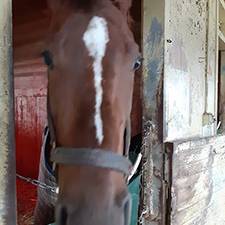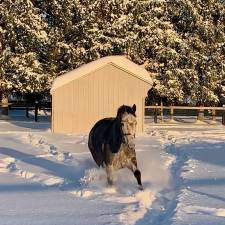EquitopiaCenter.com presents "Solving Horse Behavior Problems; Low-Stress, Effective Solutions" featuring Lauren Fraser, CHBC. Lauren Fraser is a Certified Horse Behavior Consultant with the International Association of Animal Behavior Consultants. She is also the organization's horse division Chair, and a member of the application review committee.
Horse behavior problems can be frustrating, annoying, or even downright dangerous. Behavior problems in horses may result from pain, fear, or confusion during training. Unwanted behaviors, such as poor ground manners or being 'hard mouthed' may also be unknowingly created by inexperienced trainers. Horse behavior problems can occur under saddle - bucking, bolting, spooking etc - or when being handled - aggression, refusing to trailer load, being needle or farrier phobic, cribbing, biting, kicking etc. Punishment is commonly used in an attempt to stop unwanted behaviors, but the use of punishment can create additional behavior problems in the horse (e.g. aggression), or may even make the problem behavior worse. It may also damage the trust between horse and trainer. In light of these potential side-effects, horse owners and trainers are wise to seek out other ways to resolve behavior issues.
Horse behavior consultants use a 'Least Invasive, Minimally Aversive' (A href="http://iaabc.org/about/LIMA">LIMA) approach to solve horse behavior problems. What this means is that consultants carefully assess and address the many factors that can contribute to the problem behavior. They also choose retraining techniques that will be effective for that individual horse, and which carry minimal risk for creating further behavior problems.
Some of the ways in which consultants address and resolve problems include:
-identifying and managing triggers for the unwanted behavior
-addressing any issues with management that may contribute to the problem -using counter-conditioning and desensitization to change the horse's negative emotional response to triggers (e.g. needles, farriers, the trailer) -using reinforcement-based training to teach the horse new and wanted behaviors, vs. using punishment to try to stop the unwanted behavior-teaching the horse alternative behaviors to occur in place of the unwanted behavior etc.
The techniques consultants use to resolve horse behavior problems are effective, are low-stress for the horse, and also enhance the bond between horse and owner.










